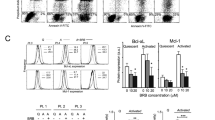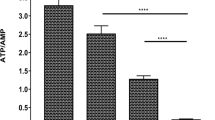Abstract
We have previously reported that vitamin K2 (VK2) but not VK1 has a potent apoptosis-inducing effect on freshly isolated leukemia cells from patients with various types of leukemia. By multi-color flow cytometric analysis using monoclonal antibody (mAb), APO2.7, which detects mitochondrial 7A6 antigen specifically expressed by cells undergoing apoptosis, we further investigated the apoptosis-inducing effect of VK2 on minor populations of leukemic blast cells in bone marrow from patients with myelodysplastic syndrome (MDS) and overt myeloid leukemia (post-MDS AML). Limiting dilution of CD95 (anti-Fas) mAb-treated apoptotic Jurkat cells with nonapoptotic CTB-1 cells revealed that APO2.7-positive Jurkat cells were consistently detectable by flow cytometry when present at levels of at least 5% in the CTB-1 suspension. In patient samples the gating area for leukemic clone was determined using cell surface antigen-specific mAbs conjugated with either fluorescein isothionate (FITC) or phycoerythrin (PE) and subsequently the cells stained with phycoerythrin cyanine (PE-Cy5)-conjugated APO2.7 mAb were assessed within the gating area of the leukemic clone for monitoring apoptosis. Treatment of the bone marrow mononuclear cells with 3–10 μM of VK2 (menaquinone-3, -4 and -5) in vitro potently induced apoptosis of the leukemic blast cells as compared with the untreated control cells in all 15 MDS patients tested. This effect was more prominent on blastic cells than that on mature myeloid cells such as CD34−/CD33++ gated cells. In addition, VK2 performed much less effectively on CD3-positive lymphoid cells. In contrast to VK2, VK1 did not show apoptosis-inducing activity. These data suggest that VK2 may be used for treatment of patients with MDS in blastic transformation.
This is a preview of subscription content, access via your institution
Access options
Subscribe to this journal
Receive 12 print issues and online access
$259.00 per year
only $21.58 per issue
Buy this article
- Purchase on Springer Link
- Instant access to full article PDF
Prices may be subject to local taxes which are calculated during checkout
Similar content being viewed by others
Author information
Authors and Affiliations
Rights and permissions
About this article
Cite this article
Yaguchi, M., Miyazawa, K., Otawa, M. et al. Vitamin K2 selectively induces apoptosis of blastic cells in myelodysplastic syndrome: flow cytometric detection of apoptotic cells using APO2.7 monoclonal antibody. Leukemia 12, 1392–1397 (1998). https://doi.org/10.1038/sj.leu.2401143
Received:
Accepted:
Published:
Issue Date:
DOI: https://doi.org/10.1038/sj.leu.2401143
Keywords
This article is cited by
-
Synergistic growth inhibition in HL-60 cells by the combination of acyclic retinoid and vitamin K2
Journal of Cancer Research and Clinical Oncology (2011)
-
Combination of 22-oxa-1,25-dihydroxyvitamin D3, a vitamin D3 derivative, with vitamin K2 (VK2) synergistically enhances cell differentiation but suppresses VK2-inducing apoptosis in HL-60 cells
Leukemia (2002)
-
Apoptosis/differentiation-inducing effects of vitamin K2 on HL-60 cells: dichotomous nature of vitamin K2 in leukemia cells
Leukemia (2001)
-
Vitamin K2 therapy for myelodysplastic syndromes (MDS) and post-MDS acute myeloid leukemia: information through a questionnaire survey of multi-center pilot studies in Japan
Leukemia (2000)



